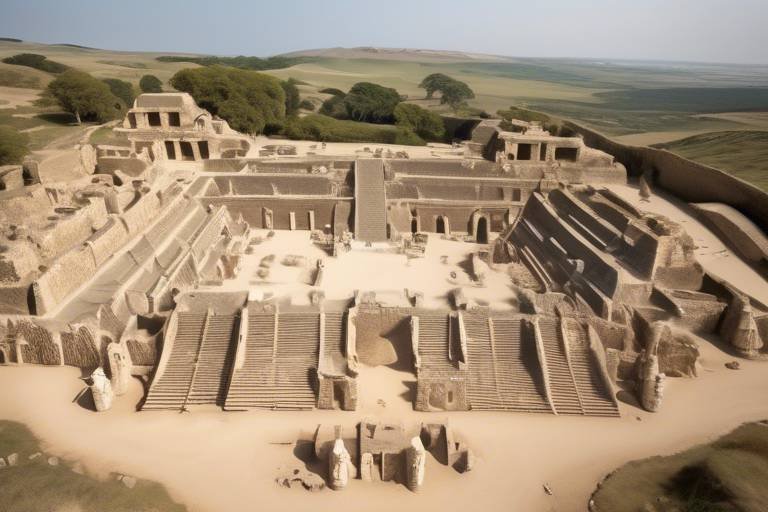The Importance of Community Involvement in Archaeological Projects
Community involvement in archaeological projects plays a pivotal role in shaping the outcomes and impact of such endeavors. By engaging local communities, archaeologists can harness a wealth of knowledge, resources, and perspectives that contribute to the preservation of cultural heritage, the advancement of research, and the promotion of public awareness and appreciation of history.
When communities actively participate in archaeological projects, they become stewards of their own cultural heritage, ensuring its protection and transmission to future generations. Through collaborative efforts, local knowledge is combined with scientific expertise to safeguard artifacts and sites, fostering a sense of shared responsibility and ownership.
Moreover, the inclusion of community members in archaeological research enhances the quality and depth of findings. Diversified perspectives offer fresh insights and interpretations, leading to more comprehensive data collection and the potential discovery of previously unknown archaeological sites.
By involving the community in archaeological initiatives, a broader audience is reached, leading to increased public awareness of the importance of heritage preservation. Through interactive and educational programs, individuals develop a deeper appreciation for history and archaeology, fostering a sense of connection to the past.
Participation in archaeological projects empowers local communities by offering opportunities for skill development, education, and cultural enrichment. Residents become active participants in the preservation of their heritage, instilling a sense of pride and belonging in their shared history.
Despite the numerous benefits of community involvement, challenges such as building trust, overcoming communication barriers, and ensuring equitable participation may arise. Strategies such as establishing transparent communication channels, conducting community outreach programs, and promoting inclusivity can help address these obstacles.
Furthermore, community engagement in archaeology brings about social and economic advantages. Tourism development, job creation, and the adoption of sustainable practices for heritage management contribute to the overall well-being and prosperity of local communities.
As we navigate the complexities of community involvement in archaeological projects, it is essential to consider ethical considerations. Respecting indigenous knowledge, addressing conflicts of interest, and promoting fair collaboration and representation are crucial aspects that must be prioritized in all interactions with local communities.
Looking ahead, the future of community involvement in archaeology holds promising opportunities for meaningful partnerships and collaborative research efforts. By adhering to best practices, promoting inclusivity, and maximizing the benefits of community engagement, we can pave the way for a more enriched and sustainable approach to archaeological exploration.

Preservation of Cultural Heritage
Exploring the significance of engaging local communities in archaeological endeavors to foster collaboration, preserve cultural heritage, enhance research outcomes, and promote public awareness and appreciation of history.
When it comes to the preservation of cultural heritage, involving local communities in archaeological projects plays a crucial role. Through shared stewardship and the utilization of local knowledge, community participation aids in preserving and protecting cultural artifacts and sites for future generations. Imagine the collective effort of community members working hand in hand with archaeologists to safeguard and maintain historical treasures, ensuring that the rich tapestry of our past remains intact for years to come.

Enhancing Research Outcomes
Exploring the significance of engaging local communities in archaeological endeavors to foster collaboration, preserve cultural heritage, enhance research outcomes, and promote public awareness and appreciation of history.
When it comes to archaeological projects, involving the local community can significantly enhance research outcomes in various ways. By working together with community members, archaeologists gain access to diversified perspectives that can shed new light on historical findings. Moreover, community participation leads to increased data collection, as locals often possess valuable knowledge about the area's history and cultural significance. This collaboration can even result in the discovery of previously unknown archaeological sites, enriching the overall research experience and expanding our understanding of the past.

Public Awareness and Appreciation
Exploring the significance of engaging local communities in archaeological endeavors to foster collaboration, preserve cultural heritage, enhance research outcomes, and promote public awareness and appreciation of history.
When it comes to archaeological projects, involving the community plays a crucial role in raising public awareness and fostering a deep appreciation for history and archaeology. By actively engaging local residents, these projects can transcend mere academic pursuits and become a shared journey of discovery and understanding.
Imagine a scenario where a community comes together to unearth ancient artifacts buried beneath their own feet. The excitement and sense of connection that arise from such discoveries can ignite a spark of curiosity and appreciation for the rich tapestry of history woven into the very fabric of their surroundings.
Through community involvement, archaeological projects can transform from distant, abstract concepts into tangible experiences that resonate with individuals on a personal level. By inviting people to participate in excavations, workshops, and educational programs, these projects become living, breathing entities that bridge the gap between the past and the present.
Moreover, by sharing knowledge and insights gained from these collaborative efforts, communities can develop a sense of pride and ownership in their cultural heritage. As they witness the fruits of their labor unfold before their eyes, a sense of stewardship and responsibility naturally emerges, leading to a deeper respect for the importance of preserving and protecting historical treasures for future generations.
Ultimately, community involvement in archaeological projects serves as a powerful tool for instilling a sense of wonder and curiosity about the past, inspiring individuals to become ambassadors for heritage preservation and advocates for the value of history in shaping our collective identity.

Empowering Local Communities
Empowering local communities through involvement in archaeological projects is a transformative process that goes beyond mere excavation and research. It is about giving individuals a sense of ownership and pride in their cultural heritage, instilling a deeper connection to their roots, and providing opportunities for personal and communal growth. By actively engaging local residents, archaeological initiatives can create a ripple effect of positive change within the community.
One way community involvement empowers local residents is through skill development. By participating in archaeological projects, community members have the chance to learn new skills such as artifact preservation, site mapping, and historical interpretation. These newfound abilities not only enrich their knowledge but also open up potential avenues for employment and career advancement.
Education is another key aspect of empowering local communities. By working alongside archaeologists and researchers, community members gain valuable insights into their heritage, history, and the scientific process behind archaeological investigations. This educational experience can spark a sense of curiosity and lifelong learning, encouraging individuals to delve deeper into their cultural background.
Furthermore, community involvement fosters a sense of pride and responsibility among local residents. When individuals actively contribute to the preservation and study of their heritage, they develop a sense of stewardship towards the cultural resources in their midst. This sense of ownership instills a commitment to protecting and promoting their heritage for future generations to appreciate and cherish.
In essence, empowering local communities through archaeological projects is not just about unearthing artifacts or uncovering ancient mysteries. It is about empowering individuals to become guardians of their own history, advocates for cultural preservation, and champions of community resilience and pride.

Challenges and Solutions
Exploring the significance of engaging local communities in archaeological endeavors to foster collaboration, preserve cultural heritage, enhance research outcomes, and promote public awareness and appreciation of history.
Engaging local communities in archaeological projects comes with its own set of challenges. One significant hurdle is building trust between archaeologists and community members. Establishing trust is crucial as it involves sharing responsibilities, knowledge, and decision-making processes. Communication barriers can also impede effective collaboration. Ensuring clear and open communication channels is essential to address misunderstandings and promote transparency.
Equitable participation is another challenge faced in community involvement. It is vital to ensure that all community members have equal opportunities to contribute and that diverse voices are heard. Overcoming these challenges requires implementing inclusive practices that value local knowledge and perspectives.
One solution to these challenges is to involve community members from the project's inception. By including locals in the planning and decision-making phases, trust can be built, and communication barriers can be minimized. Creating platforms for open dialogue and feedback can also enhance collaboration and address any concerns or conflicts that may arise.
Additionally, providing training and capacity-building opportunities for community members can empower them to actively participate in archaeological projects. Education programs that focus on heritage preservation, archaeological techniques, and cultural significance can help bridge the gap between professionals and local residents.
Collaborating with community leaders and organizations can further strengthen partnerships and ensure that projects align with the community's needs and values. By fostering mutual respect and understanding, archaeologists can navigate ethical considerations and promote sustainable practices in heritage management.
Overall, addressing the challenges of community involvement in archaeology requires a holistic approach that values inclusivity, transparency, and mutual respect. By overcoming these obstacles, archaeological projects can benefit from diverse perspectives, local knowledge, and meaningful community engagement.
Stay tuned for the answers to commonly asked questions about community involvement in archaeological projects!

Social and Economic Benefits
Engaging local communities in archaeological projects not only contributes to the preservation of cultural heritage but also brings forth significant social and economic benefits. By involving residents in these endeavors, archaeologists can catalyze positive changes that extend beyond the realm of research and conservation.
One of the primary social benefits of community involvement in archaeology is the promotion of tourism development. When local communities actively participate in preserving and showcasing archaeological sites, it creates opportunities for sustainable tourism initiatives. Visitors are drawn to these culturally rich areas, boosting local economies and creating job opportunities in the hospitality and tourism sectors.
Furthermore, the collaborative nature of involving communities in archaeological projects fosters a sense of pride and ownership among residents. By being actively engaged in heritage preservation, individuals develop a deeper connection to their cultural roots and history. This empowerment not only enhances community cohesion but also instills a shared responsibility for safeguarding valuable archaeological resources.
From an economic perspective, community involvement in archaeology can lead to the creation of new businesses and services catering to heritage tourism. Local artisans, guides, and entrepreneurs can capitalize on the influx of visitors interested in exploring archaeological sites, thus diversifying the local economy and promoting sustainable practices for heritage management.
Moreover, by integrating archaeological projects into community development initiatives, researchers can address social challenges and promote inclusive growth. Through education and skill development programs linked to heritage preservation, local residents can acquire new competencies and enhance their employability, contributing to overall socio-economic advancement.
In essence, the social and economic benefits of engaging communities in archaeological endeavors are manifold, ranging from fostering cultural pride and sustainable tourism to promoting economic diversification and community empowerment. By recognizing the value of local participation, archaeologists can not only enrich research outcomes but also catalyze positive transformations that resonate far beyond the boundaries of excavation sites.

Ethical Considerations
When engaging local communities in archaeological projects, it is crucial to consider various to ensure respectful and equitable collaboration. One of the primary ethical considerations is the respect for indigenous knowledge. Indigenous communities often hold valuable insights and traditional knowledge about archaeological sites, and it is essential to involve them in decision-making processes and acknowledge their expertise.
Another important ethical consideration is addressing conflicts of interest. In archaeological projects involving local communities, conflicts may arise regarding the management and interpretation of cultural heritage. It is essential to navigate these conflicts transparently, prioritize the interests of the community, and seek mutually beneficial solutions.
Ensuring equitable collaboration and representation is also a key ethical consideration. All stakeholders, including community members, archaeologists, and heritage professionals, should have equal opportunities to participate in project planning, implementation, and decision-making. This promotes inclusivity and fosters a sense of ownership among community members.
Moreover, obtaining informed consent from community members before conducting archaeological activities is essential. Respecting the autonomy and agency of individuals within the community is paramount to building trust and fostering positive relationships. Clear communication about the project's goals, methods, and potential outcomes is crucial in obtaining informed consent.
Additionally, protecting sensitive information and cultural heritage is a fundamental ethical consideration. Archaeologists and researchers must handle artifacts, sites, and data with care and sensitivity, ensuring that information is not exploited or misused. Respecting the privacy and confidentiality of community members and their cultural practices is essential in maintaining trust and integrity within the project.

Future Directions and Best Practices
When looking towards the future of community involvement in archaeological projects, it is essential to focus on fostering meaningful partnerships and promoting inclusivity. By establishing strong relationships with local communities, archaeologists can gain valuable insights, access to resources, and support for their endeavors. Best practices dictate that communication should be transparent and ongoing, ensuring that all stakeholders are informed and engaged throughout the project.
Furthermore, promoting inclusivity means actively seeking out diverse perspectives and voices within the community. This can be achieved through outreach programs, educational initiatives, and cultural exchanges that aim to involve individuals from different backgrounds and experiences in the archaeological process. By embracing diversity, archaeological projects can benefit from a wide range of knowledge and expertise, leading to more comprehensive research outcomes.
In addition to partnership building and inclusivity, another crucial aspect of future directions in community involvement is maximizing the benefits of collaborative research efforts. This involves not only sharing findings with the community but also actively involving community members in the interpretation and dissemination of archaeological knowledge. By empowering local residents to take ownership of their heritage, archaeologists can ensure that the impact of their work extends beyond academic circles and into the everyday lives of those directly affected.
Moreover, it is important to consider sustainability in all aspects of community involvement in archaeology. This includes not only the preservation of physical sites and artifacts but also the long-term well-being of the communities involved. By promoting sustainable practices for heritage management, such as eco-friendly tourism initiatives and local capacity building, archaeologists can ensure that their work has a positive and lasting impact on both the cultural and economic landscape of the region.
In conclusion, the future of community involvement in archaeological projects lies in building strong partnerships, promoting inclusivity, maximizing collaborative efforts, and ensuring sustainability. By adhering to best practices and embracing these principles, archaeologists can create a more inclusive, diverse, and impactful field of study that benefits both the past and present generations.
Frequently Asked Questions
- Why is community involvement important in archaeological projects?
Community involvement in archaeological projects is crucial for fostering collaboration, preserving cultural heritage, enhancing research outcomes, and promoting public awareness and appreciation of history. Local communities hold valuable knowledge about their heritage and can provide unique perspectives that enrich archaeological endeavors.
- How does community participation contribute to the preservation of cultural heritage?
Engaging local communities in archaeological projects helps in preserving and protecting cultural artifacts and sites for future generations. Through shared stewardship and local knowledge, communities play a vital role in safeguarding heritage resources and ensuring their sustainable management.
- What are the benefits of involving the community in archaeological research?
Community participation enhances research outcomes by diversifying perspectives, increasing data collection, and uncovering new archaeological sites. Collaborating with local residents not only enriches the research process but also fosters a deeper connection between people and their heritage.
- How does community involvement empower local communities?
Community involvement empowers local residents by providing opportunities for skill development, education, and instilling a sense of ownership and pride in their cultural heritage. By actively engaging in archaeological projects, communities can strengthen their identity and contribute to heritage conservation.



















